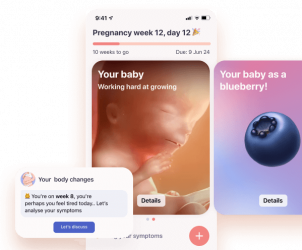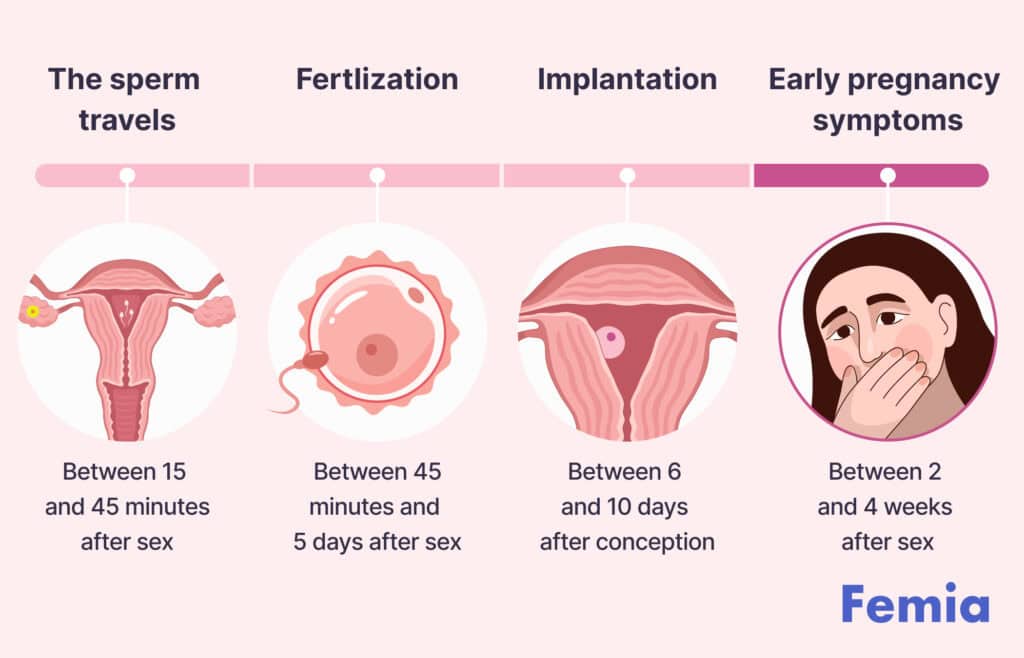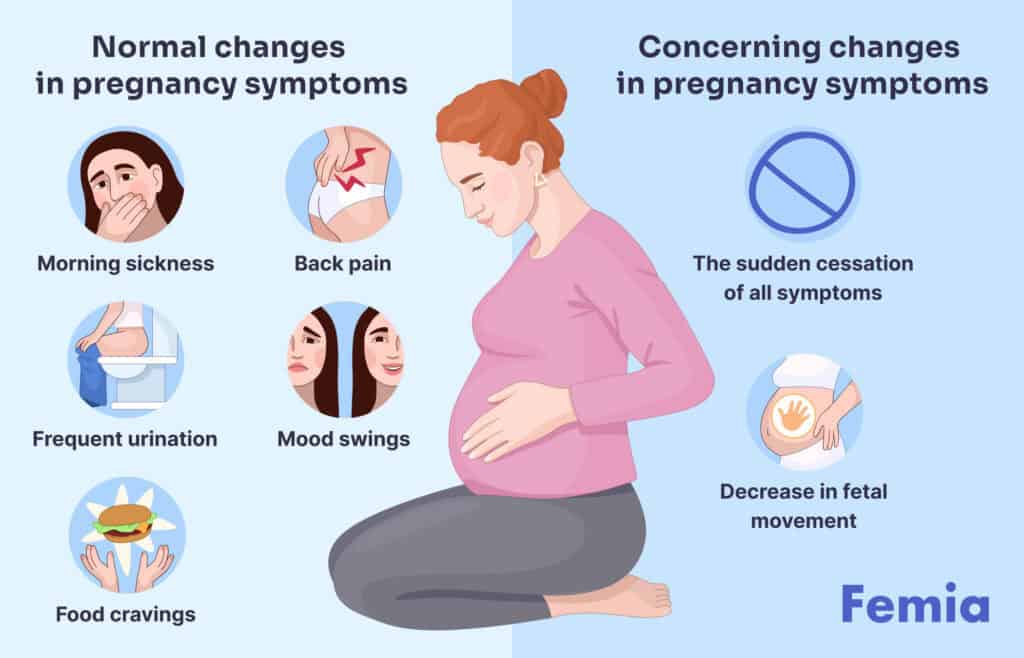Femia > Health Library > Pregnancy > Pregnancy health > Pregnant but no symptoms? Understanding early pregnancy and what to expect
Is it normal to not feel pregnant? Understanding early pregnancy and what to expect

- Updated Mar 2, 2025
- Published
CRAFTED BY HUMAN
Crafted by human At Femia, we provide accurate and up-to-date information at every stage of your journey, from trying to conceive, pregnancy and postnatal support. All content is created by a real person based on in-depth research and own professional experience. Femia ensures that you will receive expert advice, strict accuracy and a personalized approach from our authors/medical experts. Learn more about our editorial policy.
FACT CHECKED
Fact checked At Femia Health, we maintain the highest standards of editorial excellence in delivering content focused on helping you conceive, guiding you through pregnancy, and supporting you postpartum. Explore our content review principles to learn how we ensure the accuracy and quality of our health and lifestyle tips for every stage of your journey.
Not feeling pregnant in the first trimester is normal. Pregnancy symptoms vary widely, and some women may not experience symptoms or visible changes until later. See your doctor regularly to monitor your baby’s development.
Sometimes pregnancy is described as something magical and perfect, as we should feel the “birth” of our baby and be in awe of it. However, it often happens that women simply think, “I don’t feel pregnant.” Anxiety from this awareness and worry about our normalcy can arise very quickly and devour us.
However, we hasten to assure you that the absence of symptoms itself is not a problem. What else can you expect from your pregnancy? Find out more in our article.

Is it normal to sometimes not feel pregnant in the first trimester?
Not feeling pregnant for a while is completely normal. It is due to many factors, but doubts most often arise when we don’t experience the first symptoms of gestation (nausea, fatigue, frequent urination).
Every woman’s body perceives pregnancy differently, so the way you experience (or don’t experience) these symptoms can be caused by many things. It could be related to hormones, or you may have attributed your symptoms to other reasons like stress or changes in diet.
How soon can you get pregnancy symptoms?
Pregnancy symptoms can start as early as a week or two after conception, but it varies widely. You may feel them a little later, around nine weeks, or even not until the end of the first trimester. The absence of symptoms in itself is not a problem. In addition, some women simply find that not having symptoms makes it easier to cope with gestation.

Reason not feel pregnant at first trimeter
If you mentally do not feel pregnant, it may be due to the following reasons:
No external changes. In the first weeks of childbearing, changes in the embryo are minimal, and your body does not outwardly show signs of pregnancy. This can be misleading and make you not feel like you’re really pregnant. The effect, however, passes with time.
Stereotypes and expectations. Standards imposed by our society about how a woman should feel during pregnancy can provoke a strong internal conflict. Not experiencing significant symptoms of gestation or otherwise fitting expectations about pregnancy may lead to doubt and anxiety about being pregnant, or even feelings of wrongness. Lack of support from loved ones can also increase these feelings.
Stress. Persistent stress and anxiety, which can progress into depressive states, can take a toll on how you feel.
Defense mechanism. Sometimes, when a mother is not quite ready for a child, she will be psychologically unable to accept its existence. The fear of losing your baby can likewise distance one from their pregnancy, which can make it difficult to feel pregnant.
The absence of symptoms does not necessarily mean there is a problem. However, it is best to consult your healthcare provider if you feel anxious.
@femia.fertility Two-week-wait symptoms that actually mean pregnancy! They can be very informative if you know how your body behaves in each cycle phase. Log your symptoms on the period tracker to know if you're experiencing early pregnancy signs. #pregnancy #earlypregnancysymptoms #pregnancysymptoms #ttccommunity #2ww #pregnancytest #pregnancytracker #implantation #realstory #momcommunity #ugc #momtok ♬ original sound - Femia fertility tracker
No symptoms at 6 or 8 weeks pregnant
Is it normal to sometimes not feel pregnant in the first trimester? The absence of symptoms at week 6 is still not a cause for concern.
Every woman is unique; therefore, if there are no other reasons for concern, there is no need to worry. Every pregnancy is different, and many women begin to experience symptoms later. You may simply have no symptoms at six weeks pregnant, or experience a mild version of them, which is completely normal.
Talk to your healthcare provider
Still, even if there is nothing to worry you about, you should always visit your healthcare professional regularly to ensure the fetus is developing steadily. There are, however, serious reasons for going to the healthcare provider, for example:
- Severe abdominal or back pain;
- Vaginal bleeding;
- A sharp, sudden cessation of some symptoms, and the appearance of other symptoms that are unusual for you.
To identify and address any issues early, talk to your doctor regularly.

Pregnancy with no symptoms: How to stop worrying?
If you don’t feel pregnant at eight weeks because there are no symptoms, it’s only a matter of time before feelings of anxiety arise. The feeling is complicated to cope with, because sometimes it is difficult to tell loved ones that you feel “abnormal.” There are, however, strategies to combat it:
1. Talk to your healthcare provider
It can greatly boost your morale. Your healthcare provider should be a professional who will not judge or consider you abnormal. To relieve anxiety, you simply need to ask them all the questions you have. We understand that during your appointment, it may be difficult to remember everything you want to say (it happens to everyone), so it is important to think ahead about what you would like to know.
2. Inform yourself
Seeking more information on your own, in addition to talking with your doctor, is something easy to do to reassure yourself about your condition. Books, articles, and websites from reputable medical sources can provide useful information about how pregnancy works and what to expect at different stages. If you have evidence that your gestation is progressing normally and everything is fine, it will ease your anxiety. Moreover, you become more prepared for motherhood by reading about what to expect and listening to healthcare professionals.
3. Find your community
Find people like yourself. It could be a mother who has given birth and is willing to share her experience, or it could be an expectant woman who, like you, is very anxious about her gestation. Sharing experiences and understanding that you are not alone helps relieve the fear.
Remember to trust the people closest to you. Voicing your concerns and letting them reassure you is crucial to coping more easily.If you feel it is not enough, try contacting a professional psychologist or psychotherapist to discuss what is bothering you so much.
How can I tell if there’s a problem with my pregnancy?
During pregnancy, a mom-to-be might want to pay special attention to her wellbeing. At this time, any unusual symptoms, even if they are caused by another problem, should be taken seriously.
It is essential to notice concerning signs as early as possible and consult a healthcare professional. Not only the fetus but also the expectant woman’s body itself can suffer from ignoring these symptoms. Here are some symptoms that you should see a healthcare provider right away if you experience:
- Severe and/or prolonged back pain;
- Any vaginal bleeding;
- Constant and/or severe headaches;
- Any changes in vision;
- Sudden, severe swelling of the face or limbs;
- Burning or pain when urinating;
- Increased body temperature for no apparent reason.
Additionally, if you still do not feel fetal movement after 20 weeks of pregnancy, it would be best to consult a healthcare provider.

Does having no symptoms mean I'll have a miscarriage?
Unfortunately, miscarriages most often occur in the first trimester of gestation. Several symptoms may indicate it:
- Vaginal bleeding with blood clots that varies from mild to heavy
- Cramps and pain that resembles menstrual pain (especially if there is bleeding!)
- Vaginal discharge of tissue or clots
- Severe weakness and dizziness
- Sudden decrease or disappearance of childbearing symptoms
If you experience these symptoms, contact your healthcare provider immediately. Try to remember and track your sensations: when did they start, what kind of pain is it, and how does it manifest itself? Write it down so your healthcare provider knows more about your condition.
Questions from the Femia community
Can pregnancy be asymptomatic?
Yes, it happens rarely, but it can happen. Such cases are called “silent” or “cryptic” pregnancies. It is a condition in which a woman may not even realize she is pregnant until late in gestation.
In these cases, the woman may not experience the characteristic symptoms of childbearing, and the fetus may have very little weight and volume. This can happen because it is growing slowly or perhaps occupies a position that minimizes visible changes.
If you do not visit a healthcare professional and ignore the absence of menstruation, then a cryptic pregnancy can go virtually unnoticed. Such cases, however, greatly increase the risk for both mother and child. Being aware of one’s pregnancy allows a woman to adapt her lifestyle to the growing fetus—taking vitamins, following activity and diet restrictions, and undergoing medical examinations. These are all important measures to ensure both her and her baby’s health. So, not knowing to do these things can increase the chance of complications during childbirth and the postpartum period.
What should I do if I start feeling symptoms and then they stop?
It's common for symptoms to change. However, if you're concerned or if symptoms stop suddenly after being consistent, it's a good idea to consult with your healthcare provider. Keep track of exactly how your symptoms change and approximately when they started. It will help your healthcare provider better assess the situation and take the necessary measures in time.
How soon after a missed period should I see a doctor if I don't feel pregnant?
It's recommended to schedule your first prenatal visit within the first 8 weeks of gestation. If you have a positive test and no symptoms, it's still important to see your healthcare professional for confirmation and to begin prenatal care. Not having pregnancy symptoms may affect whether you feel pregnant, but talking to your healthcare provider can reassure you that everything is normal.
How can a sports lifestyle affect pregnancy symptoms?
An active lifestyle has a positive effect on your gestation, significantly reducing unpleasant symptoms (especially in the first trimester). Many women report that their nausea, fatigue, and poor quality of sleep go away with exercise. However, consult your healthcare provider before strenuously exercising to learn about restrictions and things that you should avoid doing, for your health and the baby’s.
How does stress affect pregnancy symptoms?
Stress can take a toll on your body during pregnancy, worsening symptoms such as nausea, fatigue, insomnia, and headaches. Moreover, chronic stress increases the risk of preterm birth. It is crucial to find a way to cope with stress and get support from loved ones.
How does professional activity affect pregnancy?
Working in an environment that is comfortable for you can support your emotional wellbeing and reduce stress. However, many jobs may not be suitable during pregnancy: heavy physical work, long periods of standing, and stressful work conditions, for example. It is important to adapt your conditions and regimen during gestation. You should see your healthcare professional regularly, even if you have a busy schedule.
The bottom line
Not feeling pregnant in the first trimester is completely normal. You may simply not associate yourself with an expectant woman because you are pregnant but no symptoms occur. You may also feel this way due to the lack of visible physical changes, which are minimal in the first trimester. Not experiencing symptoms until later is usually not a cause for concern. But if you are experiencing anxiety or some symptoms are bothering you, don’t hesitate to go to the healthcare provider.
References
- “What are some common signs of pregnancy?”Eunice Kennedy Shriver National Institute of Child Health and Human Development. 2017. Available at: https://www.nichd.nih.gov/health/topics/pregnancy/conditioninfo/signs.
- “Incorporating early pregnancy mental health screening and management into routine maternal care: experience from the Rajarata Pregnancy Cohort (RaPCo), Sri Lanka.”Thilini Agampodi. 2023. Available at: https://gh.bmj.com/content/8/9/e012852.
- “Cryptic Pregnancy.”Cleveland Clinic. 2022. Available at: https://my.clevelandclinic.org/health/diseases/24428-cryptic-pregnancy.
- “Cryptic pregnancy.”Kirsten Duckitt. 2023. Available at: https://www.ncbi.nlm.nih.gov/pmc/articles/PMC10334309/.
- “Physical activity during pregnancy: a systematic review for the assessment of current evidence with future recommendations.”Leona Cilar Budler, Marko Budler. 2022. Available at: https://bmcsportsscimedrehabil.biomedcentral.com/articles/10.1186/s13102-022-00524-z.

Learn the signs of a high sex drive in female, factors that influence women libido, and tips on how to manage and embrace your desires for a healthy sexual life.

How do you distinguish between discharge before period vs early pregnancy? Click here for a comprehensive guide that will help you understand the difference.

Discover the symptoms, causes, treatment and misconceptions of low testosterone in women, including age-related testosterone levels and when to consult a doctor.

